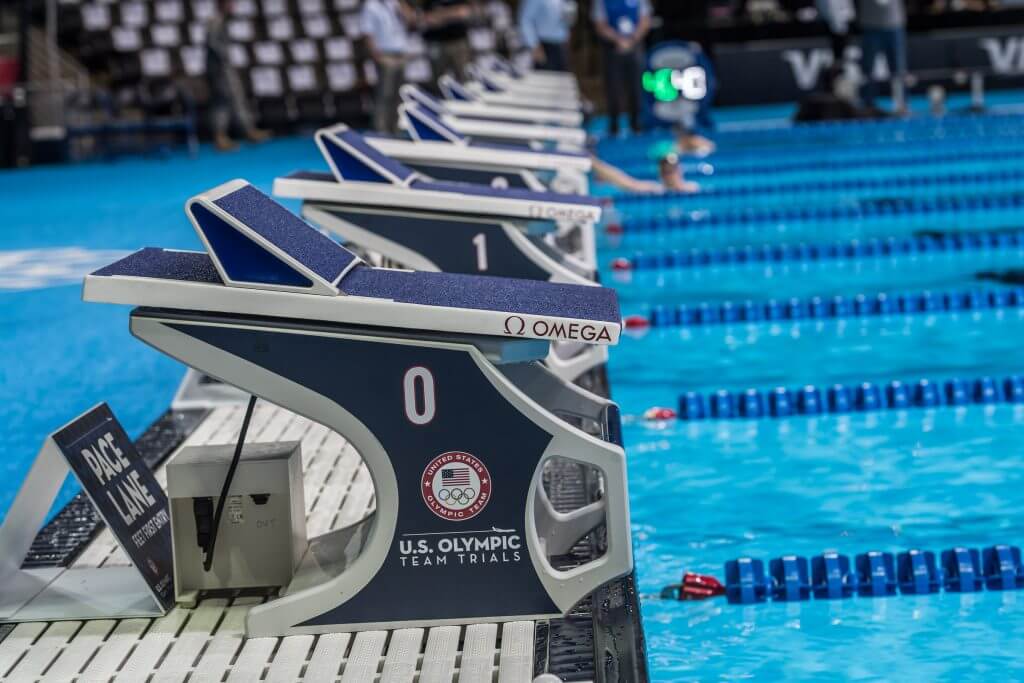Are Olympic swimmers ever nervous on the starting blocks?

Analyzing the Emotional Impact of Pre-Race Nerves on Olympic Swimmers
Are Olympic swimmers ever nervous on the starting blocks? Absolutely! Olympic swimmers, like all athletes, feel a range of emotions before and during a race. Nerves and anxiety are natural, and for many swimmers, they are part of the pre-race routine. It is important for swimmers to understand the impact of pre-race nerves and how to manage them so that the swimmer can perform their best.
Recognizing Pre-Race Nerves
Many swimmers feel a heightened level of anxiety before a race. This anxiety can manifest in physical symptoms, such as an increased heart rate and shortness of breath, as well as mental symptoms, such as difficulty concentrating and negative thoughts. Swimmers should not be ashamed of feeling these emotions and should instead recognize them as normal.
Managing Pre-Race Nerves
Pre-race nerves can be managed with a variety of techniques. Visualization is one of the most popular. Visualization involves picturing oneself performing well during the race, from the start to the finish. Swimmers should practice visualization regularly, as it can be difficult to do in the moments before a race. Other techniques, such as deep breathing and muscle relaxation, can also be used to help calm nerves.
Using Pre-Race Nerves to Your Advantage
Some swimmers can use pre-race nerves to their advantage. If a swimmer is feeling anxious before a race, they can use that energy to become focused and motivated. Swimmers should remember that pre-race nerves are natural and can even be helpful in getting them into a competitive mindset.
Conclusion
Pre-race nerves are a natural part of competition for Olympic swimmers. It is important for swimmers to recognize and manage their pre-race nerves so that they can perform their best. With practice, swimmers can learn to use pre-race nerves to their advantage and boost their performance.
How to Overcome Pre-Race Nerves and Achieve Olympic Swimming Success
Are Olympic swimmers ever nervous on the starting blocks? It’s completely understandable if they were; they’re competing in one of the most prestigious events in the world, with millions of viewers watching. But Olympic swimmers don’t need to let the pressure get to them. There are several strategies they can use to channel their pre-race nerves into positive energy, so that they can achieve Olympic swimming success.
1. Visualize Your Success
Visualizing success is an effective way to calm pre-race nerves. Before the race, Olympic swimmers should take a few minutes to close their eyes and imagine what it will feel like to swim their best. They can visualize their perfect race, from start to finish. This will help them to focus on their goals and build confidence in their abilities.
2. Take Deep Breaths
Before the race, Olympic swimmers should take a few moments to focus on their breathing. Taking deep, slow breaths can help alleviate feelings of anxiety and help the body to relax. This will help them to stay calm and focused when they’re on the starting blocks.
3. Listen to Music
Listening to music is a great way to help Olympic swimmers to relax and stay focused. Music can be a great source of motivation, and it can also help to block out any negative thoughts or distractions. Olympic swimmers can create a playlist of their favorite songs that they can listen to before the race to help them stay calm and focused.
4. Talk to Other Swimmers
Socializing with other swimmers can be a great way to take their mind off the upcoming race and to relax. Talking to others can help to distract them from their nerves, and it can also be a great way to build relationships with other athletes. This will help them to feel more comfortable and confident on the starting blocks.
5. Focus on Your Strengths
It’s important for Olympic swimmers to remember to focus on their strengths. Instead of worrying about their weaknesses or what their competitors are doing, they should take a few moments to remind themselves of their strengths and focus on what they can do well. This will help them to stay confident and focused on their own performance.
6. Stay Positive
It’s easy to get caught up in negative thoughts before a race, but it’s important for Olympic swimmers to stay positive. They should avoid dwelling on mistakes or worrying about the future, and instead focus on the present moment. This will help them to stay calm and focused on their race, and to stay optimistic that they can achieve their goals.
Exploring the Mindset of Elite Olympic Swimmers on the Starting Blocks
The Olympics are a prestigious event, full of world-class athletes. Swimming is one of the most popular events, and the swimmers who compete in the Olympics are some of the best in the world. But what is it like for them on the starting blocks? Are they ever nervous?
It's no surprise that elite Olympic swimmers have nerves before they get on the starting blocks. After all, they have worked hard to get to this moment, and they know that they are competing against the best in the world. The pressure can be intense, and it's only natural to feel a bit of anxiety.
That said, Olympic swimmers are highly trained professionals. They have put in countless hours of practice and training, and they are well-prepared for the task at hand. They know that they have done everything they can to put themselves in the best position to succeed, and that knowledge can help them stay focused and confident on the starting blocks.
The key to success for Olympic swimmers is to stay in the present. They need to focus on the task at hand and not worry about the future or the past. By doing this, they can stay calm and collected and bring their best performance to the starting blocks.
Olympic swimmers also have the advantage of experience. They have likely been in this situation before, and they know what to expect. This can help them stay calm and focused, as they know what to expect and how to handle it. Knowing what to expect can help them stay in control of their nerves and remain confident on the starting blocks.
Finally, Olympic swimmers also have the advantage of being part of a team. They have the support of their coaches, teammates, and family, and they know they are not alone. This can provide them with the motivation and encouragement they need to stay focused and competitive on the starting blocks.
In conclusion, it's understandable that Olympic swimmers may feel a bit of anxiety on the starting blocks. However, they are highly trained professionals who know how to stay focused and confident in order to bring their best performance to the starting line. With the right mindset and the support of their team, Olympic swimmers can remain calm and collected on the starting blocks and go for gold.
The Science Behind Pre-Race Nerves and How to Manage Them for Optimal Performance
It's not uncommon for Olympic swimmers to experience a bit of anxiety when they step onto the starting blocks. After all, they are competing at the world's highest level, with millions of eyes watching. But what is it that causes this pre-race fear and how can they manage it to ensure peak performance?
At the core of pre-race anxiety is the fear of failure. Swimmers may fear that they will not perform as well as they are capable of, or that they will not win. This fear can manifest itself in a variety of ways, from physical symptoms such as increased heart rate and perspiration, to mental and emotional symptoms such as negative thoughts and feelings of dread. In some cases, the fear of failure can be so powerful that it can actually interfere with performance.
The key to managing pre-race nerves is to understand the science behind them. Studies have shown that pre-race anxiety is actually a product of the body's fight-or-flight response. When we are faced with a perceived threat, our bodies release a surge of adrenaline and cortisol to help us respond quickly and effectively. This is the same response that is triggered when we are faced with a physical or emotional challenge, such as competing in an Olympic swimming event.
The key to managing pre-race anxiety is to understand that the fight-or-flight response is a normal, healthy response. It is not something that should be feared or avoided. Instead, it should be used as a tool to help swimmers focus and perform at their best. Swimmers can learn to recognize the physical sensations associated with the fight-or-flight response and use them to their advantage. For example, they can use the increased heart rate and perspiration as a cue to focus and use the adrenaline rush to power their performance.
In addition to understanding the science behind pre-race nerves, swimmers can also use a variety of techniques to manage their anxiety. Deep breathing exercises, positive self-talk, and visualization techniques can all help swimmers stay calm and focused. It is also important for swimmers to create a pre-race routine that is comfortable and familiar. This can help them stay relaxed and in the moment, enabling them to perform at their highest level.
Pre-race nerves are a natural part of competing at the highest level. But with the right understanding and techniques, Olympic swimmers can learn to use their pre-race anxiety to their advantage. By understanding the science behind pre-race nerves and using techniques to manage them, swimmers can ensure that their performance is at its peak on the starting blocks.
The Role of Mental Strength in Olympic Swimming: How to Stay Focused on the Starting Blocks
It’s no secret that Olympic swimmers are incredibly talented and physically capable athletes. But being successful in the pool requires more than just physical prowess; it requires a strong mental game. Swimmers need to be able to stay focused and composed on the starting blocks and throughout a race in order to have the best chance of success.
It’s natural to feel a bit of nerves when standing on the starting blocks. The pressure of the moment, combined with the expectations of others, can make even the most experienced swimmers feel anxious. But it’s important to remember that nerves are a normal part of the process and can actually be beneficial. Knowing how to harness these feelings and use them to your advantage is key.
The best way to stay focused on the starting blocks is to practice visualization techniques. By picturing yourself in the pool and imagining how you want the race to go, you’ll be able to create a clear mental picture of success. This can help you to stay calm and focused throughout the race.
It’s also important to practice deep breathing exercises before and during the race. Taking a few deep breaths can help to relax your body and clear your mind. This will help you to stay present in the moment and focus on the task at hand.
Finally, it’s important to practice positive self-talk. Reminding yourself of your abilities and strengths can help to build your confidence and keep you motivated. By focusing on the positive, you’ll be able to stay focused and confident on the starting blocks.
Olympic swimmers may feel nervous on the starting blocks, but with the right mental preparation, they can stay focused and composed throughout the race. By visualizing the race and practicing deep breathing and positive self-talk, swimmers can stay focused and ready to take on the challenge.















